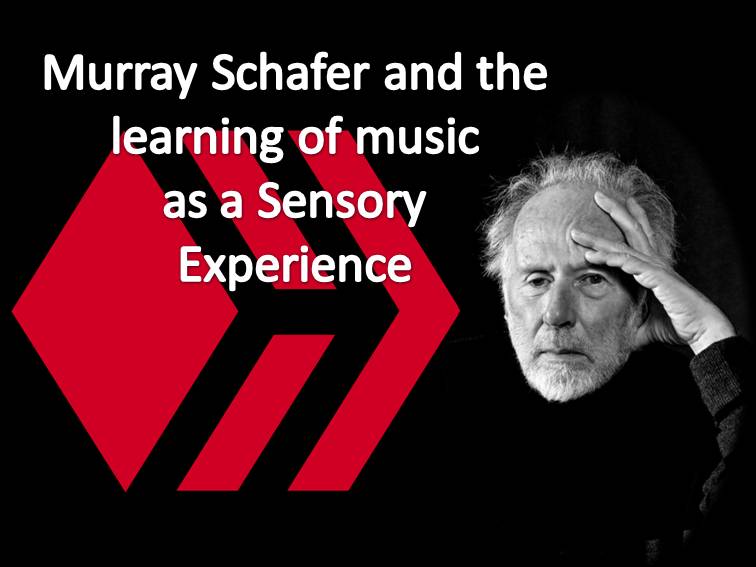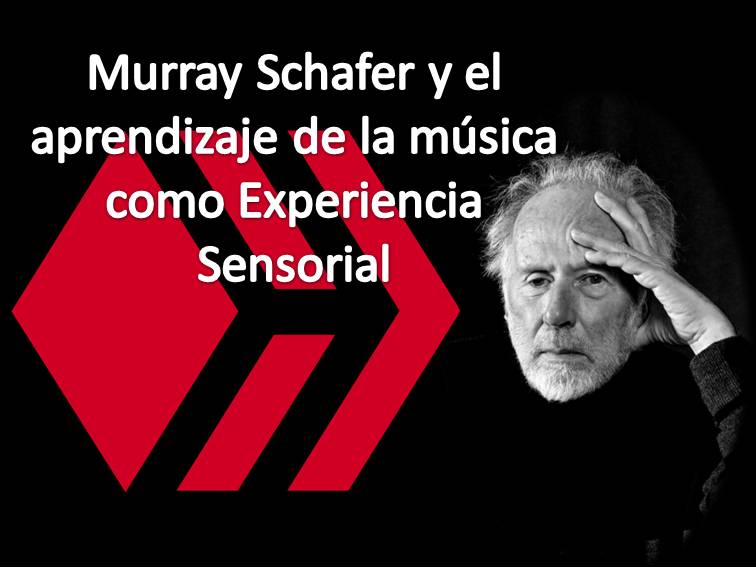La versión en Español se encuentra debajo

Raymon Murray Schafer, better known as Murray Schafer, is a composer, writer, pedagogue and environmentalist born in Sarnia (Canada), on July 18, 1933. His approach to Soundscape and Acoustic Ecology has gained worldwide importance in audioperceptual analysis and sensory training, and is based primarily on auditory training with respect to sound stimuli.
In the background, Schafer integrates a broad and deep vision on the awareness of our Sound Universe (which are all the sounds that surround us), and the Sound Landscape (which is the treatment of these surrounding sounds, as pieces for musical creation).
Schafer as a Sensory Experience and Method of Teaching Music
Well, when talking about Schafer as a proposal for teaching music we could mention as a philosophical pillar the conscious relationship of the human being with sound and silence, the value of their perception, and their use for musical composition based on completely new paradigms of musical creation; characteristics that give us a solid approach to the work of sensory training, and opens a great path of possibilities towards musical work from our own body and the sound materials that surround us.
For Schafer, the relationship and interaction that the human being achieves with his sonorous universe through the conscious use of his ear is of utmost importance, since it provides him with the necessary elements to create, later on, musical scenarios of infinite beauty that, besides performing, he can write, produce and reproduce at all times.
In the same way, another resource of great richness, which I mentioned before, and which Schafer uses as a fundamental part of his work, is the Soundscape, which is about the human relationship with the sounds of nature and with "artistic" sounds to create a context. This is also an accessible and effective working tool for the musical teaching and learning process at any stage of development.
The Schafer method also promotes the learning of inner listening, the appreciation of each sound as an element of composition and the discovery of the music that accompanies us everywhere we go.
Another very interesting element in Schafer is the means by which the sound/musical compositions can be graphed, moving away from the traditional method of musical writing, the score takes a secondary role and the creative forms that the working groups consider as the most optimal to represent their creations, giving the musical proposal an artistic/plastic dimension, which adds an added value to it.


Examples of group compositions created in working sessions with Schafer himself, based on Soundscape.
(Excerpted from the book When Words Sing)
It is also worth noting the theorist's concern for noise pollution, and for the loss of our innate hearing abilities, due to the exacerbated use of sound and noise; and the tools he provides us with for the selective perception of the sound environment.
And finally, it is also worth mentioning the great work and contribution made by Schafer for the orgumentation of his music teaching methodology through his extensive bibliography, in which works such as: Ear Cleaning, The Composer in the Classroom, The Rhinoceros in the Classroom and When Words Sing, among others, become indispensable for the deep understanding of his musical pedagogical work.
We can summarize the many benefits provided by the Schafer method by mentioning that:
It makes active and conscious listening possible.
It allows the auditory exploration of all sound sources without limiting ourselves only to musical instruments.
It addresses the sensitive dimension of human formation.
Promotes respect for nature and awareness of noise pollution.
It activates creativity from different approaches (plastic, musical...).
Cultivates inner hearing.
It relates us socially through sound.
Definitely, Schafer is a beautiful and profound musical opportunity, so go ahead and delve into it.
I hope this post was useful to you, and that you enjoyed it as much as I did writing it.
Thank you for your reading and for your time ♥
Versión en Español
Descubrir la propuesta musical de Schafer fue algo realmente trascendente en mi vida. La manera completamente novedosa de crear y comprender la música, basada en la formación y sensibilización sobre los sonidos que nos rodean y que a su vez son considerados elementos de valor compositivo, fue la apertura a un nuevo mundo de posibilidades en mi visión del mundo musical contemporáneo.

Raymon Murray Schafer, mejor conocido como Murray Schafer, es un compositor, escritor, pedagogo y ambientalista nacido en Sarnia (Canada), el 18 de Julio de 1933. Su propuesta sobre el Paisaje Sonoro y la Ecología Acústica han adquirido importancia mundial en materia de análisis audioperceptivo y formación sensorial, y está basada principalmente en la formación auditiva respecto a los estímulos sonoros
De fondo, Schafer integra una visión amplia y profunda sobre la consciencia de nuestro Universo Sonoro (que son todos los sonidos que nos rodean), y el Paisaje Sonoro (que es el tratamiento de estos sonidos circundantes, como piezas para la creación musical).
Schafer como Experiencia Sensorial y Método de Enseñanza de la Música
Bien, al hablar de Schafer como propuesta de enseñanza de la música podríamos mencionar como pilar filosófico la relación consciente del ser humano con el sonido y el silencio, el valor de la percepción de los mismos, y su uso para la composición musical basada en paradigmas de creación musical completamente novedosos; características que nos brindan un enfoque sólido para el trabajo de formación sensorial, y nos abre un gran camino de posibilidades hacia el trabajo musical a partir de nuestro propio cuerpo y de los materiales sonoros que nos rodean.
Para Schafer, la relación e interacción que el ser humano logra con su universo sonoro a través del uso consciente de su oído es de suma importancia, pues lo provee de los elementos necesarios para crear, posteriormente, escenarios musicales de infinita belleza que además de ejecutar, puede escribir, producir y reproducir en todo momento.
Del mismo modo, otro recurso de gran riqueza, que antes mencionaba, y que Schafer utiliza como parte fundamental de su trabajo, es el Paisaje Sonoro, que se trata de la relación humana con los sonidos de la naturaleza y con sonidos “artificiales” para crear un contexto. Ésta es además, para el proceso de enseñanza y aprendizaje musical, una herramienta de trabajo accesible y eficaz en cualquier etapa de desarrollo.
El método Schafer también promueve el aprendizaje de la escucha interna, la valoración de cada sonido como un elemento de composición y el descubrimiento de la música que nos acompaña a todos los lugares a los que vamos.
Otro elemento sumamente interesante en Schafer son los medios mediante los cuales las composiciones sonoras/musicales pueden ser graficadas, alejándose del método tradicional de escritura musical, la partitura toma un papel secundario y pasan a tomar parte principal las formas creativas que los grupos de trabajo consideren como las más óptimas para representar sus creaciones, dándole a la propuesta musical, una dimensión, además, artística/plástica, la cual añade un valor agregado a la misma.


Ejemplos de composiciones grupales creadas en sesiones de trabajo con el propio Schafer, basadas en el Paisaje Sonoro
(Extraídos del libro cuando las palabras cantan)
También es de hacer notar la preocupación del teórico por la contaminación acústica, y por la pérdida de nuestras capacidades de audición innatas, debido al uso exacerbado del sonido y del ruido; y las herramientas que nos brinda para la percepción selectiva del medio sonoro.
Y por último, también cabe destacar el gran trabajo y contribución realizada por Schafer para la argumentación de su metodología de enseñanza de la música por medio de su amplia bibliografía, en la que obras como: Limpieza de Oídos, El Compositor en el Aula, El Rinoceronte en el Aula y Cuando las Palabras Cantan, entre otras, se vuelven imprescindibles para la comprensión profunda de su trabajo pedagógico musical.
Podemos resumir los muchos beneficios brindados por el método Schafer mencionando que:
Posibilita la escucha activa y consciente.
Permite la exploración auditiva de todas las fuentes sonoras sin reducirnos sólo a los instrumentos musicales.
Aborda la dimensión sensible de la formación humana.
Promueve el respeto por la naturaleza y la consciencia sobre la contaminación acústica.
Activa la creatividad desde distintos enfoques (plásticos, musicales…).
Cultiva la audición interna.
Nos relaciona socialmente desde el sonido.
Definitivamente, Schafer es una oportunidad musical hermosa y profunda, anímate a ahondar en ella.
Your content has been voted as a part of Encouragement program. Keep up the good work!
Use Ecency daily to boost your growth on platform!
Support Ecency
Vote for Proposal
Delegate HP and earn more
thank you very much for your support ♥
Congratulations @amarirosil! You have completed the following achievement on the Hive blockchain and have been rewarded with new badge(s) :
Your next target is to reach 3000 upvotes.
You can view your badges on your board and compare yourself to others in the Ranking
If you no longer want to receive notifications, reply to this comment with the word
STOPCheck out the last post from @hivebuzz: